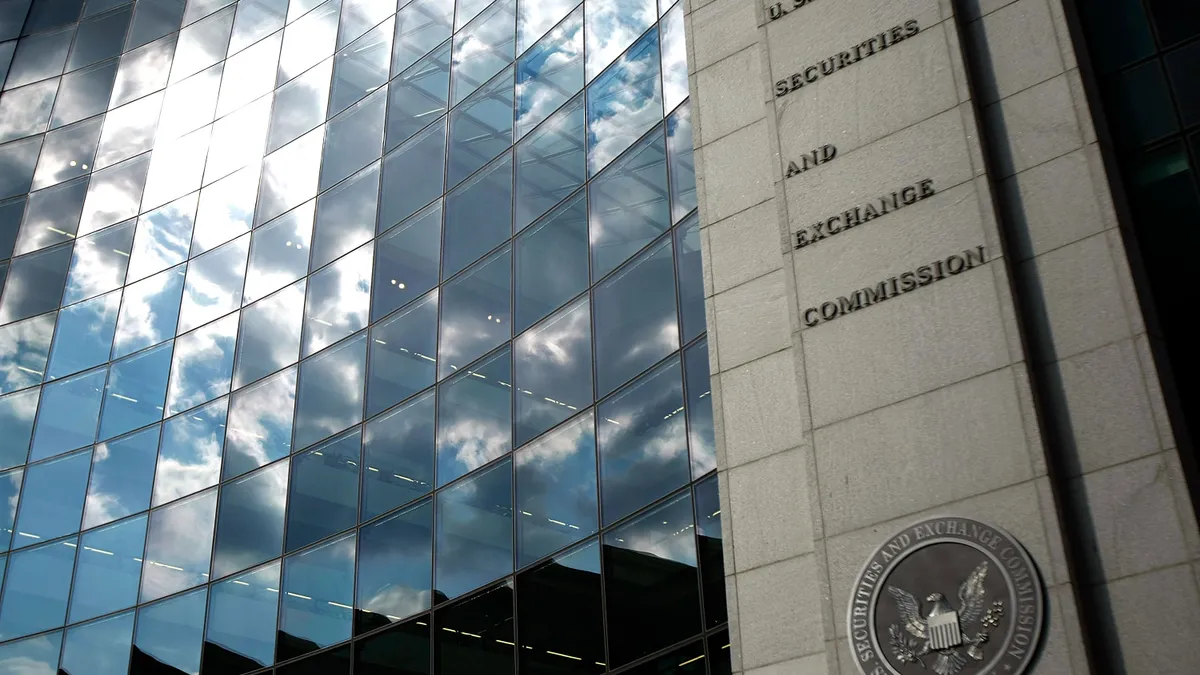Dive Brief:
- Companies and individuals paid a record $6.4 billion in civil penalties, disgorgement and prejudgment interest in fiscal year 2022 amid stepped-up enforcement action by the Securities and Exchange Commission.
- The agency took 760 actions in the year that ended September 30, a 9% increase from the year prior, but the headline announcement is the amount of penalties it imposed on violators.
- “We set a Commission record this past fiscal year for total money ordered at $6.4 billion, including a record $4.2 billion in penalties,” said Gurbir Grewal, the SEC’s enforcement chief. “We don’t expect to break these records and set new ones each year because we expect behaviors to change. We expect compliance.”
Dive Insight:
The agency said it implemented a policy to impose penalties at a level that would deter future violations. That meant recalibrating penalties, imposing prophylactic remedies and requiring admissions of guilt in cases that, in the past, it might not have.
A separate analysis by Cornerstone Research and the NYU Pollack Center for Law & Business that looked only at actions taken against public companies found that the SEC in 2022 made settlement contingent on an admission of guilt in 16 cases – 21% of defendants – the highest percentage since 2010 and double the previous high.
The ramp-up in guilty pleas suggests the SEC under Gary Gensler, the chairman since early 2021, is approaching enforcement more punitively than under the agency’s previous two chairs.

“Admissions of guilt in the first approximately 18 months of Chair Gensler’s tenure are already higher than admissions during all of Chair [Jay] Clayton’s tenure (nine) and over half the number of admissions during Chair [Mary Jo] White’s tenure (29),” the Cornerstone report said.
Guilty pleas
The focus on admissions of guilt isn’t unexpected; the SEC early in Gensler’s term announced a shift in its so-called no-admit, no-deny policy in which it would seek more guilty admissions as a condition of settlement.
“When it comes to accountability, few things rival the magnitude of wrongdoers admitting that they broke the law,” said Grewal in remarks before the Practicing Law Institute he made at the time of the policy shift. “We will, in appropriate circumstances, be requiring admissions in cases where heightened accountability and acceptance of responsibility are in the public interest.”
In fiscal year 2021, the SEC didn’t announce a single settlement with a guilty plea.
“It will be interesting to see if this trend changes [if] the SEC [seeks] admissions in certain cases as a way to improve the deterrent value of enforcement actions,” Stephen Choi of Cornerstone Research said last year.
Among the big actions the agency took this last fiscal year was a $1 billion penalty imposed on Allianz Global Investors for concealing in a massive scheme the downside risk of trading in complex options the company called Structured Alpha.
"Allianz Global Investors admitted to defrauding investors over multiple years, concealing losses and downside risks of a complex strategy, and failing to implement key risk controls," Gensler said when the settlement was announced last year.
The settlement included $675 million in civil money penalties, $315 million in disgorgement and $34 million in prejudgment interest.
Cooperation credit
The SEC said it’s offering carrots as well as sticks. In its fiscal 2022 report, it highlighted examples of penalties it reduced or eliminated for companies that demonstrated good-faith efforts to cooperate with the agency.
Among those it singled out was Headspin, the app-performance software company, whose CEO was charged with trying to drive up the company’s valuation by inflating financial metrics and doctoring internal sales records.
The SEC credited the company with taking significant steps once it learned what was going on.
Among other things, the company launched an investigation to revise its valuation based on actual income and then returned about 70% of equity to investors through a recapitalization process. It also offered to return the remaining funds in the form of promissory notes with 1% interest.
“For companies wondering what types of remedial actions and cooperation might be credited by the Commission after a company uncovers fraud, this case offers an excellent example,” Grewal said at the time.











